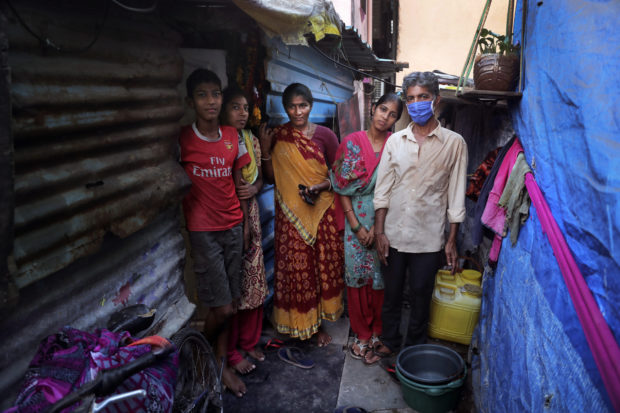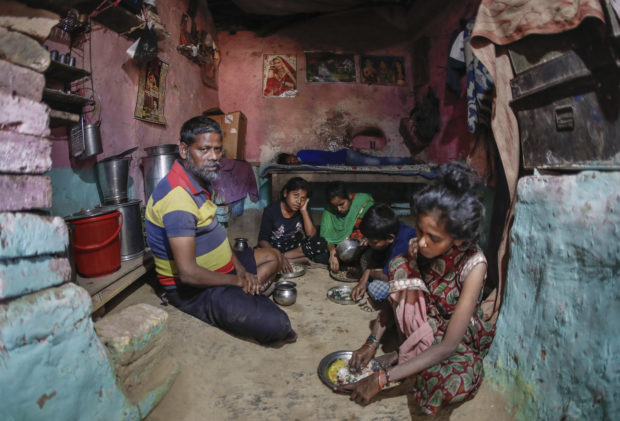‘I am so afraid’: India’s poor face world’s largest lockdown
The street peddler watched the prime minister’s speech on a battered TV with her family of five crowded around her, in a one-room house with no toilet and no running water. It’s squeezed in a shanty-town controlled by an obscure Mumbai organized crime family.
Mina Jakhawadiya knew that somewhere in India, the coronavirus had arrived, wending its way through this sprawling nation of 1.3 billion people. But the danger seemed far away.
Then it wasn’t.
“Every state, every district, every lane, every village will be under lockdown” for three weeks, Prime Minister Narendra Modi told the nation on March 24, giving India four hours’ notice to prepare.

In this April 3, 2020, photo, Mina Ramesh Jakhawadiya, center, poses for a picture with her family members, son, Ritik Ramesh, left, daughters Vaijayanti Ramesh, second left, Guddi Ramesh, second right, and husband Ramesh Karsan Jakhawadiya, outside her one-room house in a slum in Mumbai, India. Jakhawadiya makes a living selling cheap plastic goods with her husband on the streets of Mumbai. For her, the order means 21 days in a 6-by-9 foot room with five people, no work, a couple days of food and very small cash. As governments around the world debate ways to slow the spread of coronavirus, India has launched one of the most draconian social experiments in human history, locking down its entire population, including hundreds of millions of people who struggle to survive on a few dollars a day. (AP Photo/Rafiq Maqbool)
As governments around the world try to slow the spread of the coronavirus, India has launched one of the most draconian social experiments in history, locking down its entire population – including an estimated 176 million people who struggle to survive on $1.90 a day or less. Modi’s order allows Indians out of their homes only to buy food, medicine or other essentials. No going to work. No school. No playgrounds.
India’s handling of the lockdown and the ever-spreading virus is a test for the developing world, offering clues to how countries from Bangladesh to Nigeria can fight COVID-19 without forcing their poorest citizens into even worse hunger and destitution.
While India’s economy has boomed over the past two decades, inequality has also grown. Those near the top can hunker down in gated apartment complexes, watching Bollywood movies on Netflix.
Article continues after this advertisementBut not Jakhawadiya, who makes a living selling cheap plastic buckets and baskets with her husband on the streets of Mumbai. For her, the order means 21 days in a 6-by-9-foot room with five people, no work, a couple days of food, and the equivalent of about $13 in cash.
Article continues after this advertisementShe looked at Modi speaking on their little television, spattered with stickers left over the years by one child or another.
“I am so afraid,” she thought.
While India had only 469 coronavirus cases and 10 deaths when Modi gave his speech, it’s also one of the most crowded places on Earth, a nation where the coronavirus’ exponential growth means it could hopscotch from the Himalayas to South India, ravaging cities and villages.
Then there’s India’s medical system. Except for private health care for those who can afford it, the medical system barely functions across wide swathes of the country. Public hospitals, especially outside major cities, often have limited supplies, questionable cleanliness, and third-rate doctors.
Very few people have been tested, so the true scale of the outbreak is unknown. If India’s hospital system was overrun by COVID-19 cases it could collapse in days, leaving untold numbers to die.
As a result, many experts say Modi had to act as he did to buy time to prepare.
The lockdown means India has “probably pushed out the epidemic peak by three to eight weeks,” said Ramanan Laxminarayan, an epidemiologist and economist who directs the Center for Disease Dynamics, Economics and Policy in Washington, DC.
But that logic means little for the Indians at the bottom of the economic ladder.
For these people, three weeks can be an eternity.
“I know we are facing bad days ahead,” said Jakhawadiya, a fierce-eyed 47-year-old woman who, like many in India’s vast slums, is a force of will. She knew how to arrange for a daughter’s heart surgery and can support her family on her miniscule profits. But she’s never faced anything like this.
“I’m preparing, but I don’t know how I will feed my family.”

In this April 5, 2020, photo, Rajesh Dhaikar sits in his one-room small house as his family eats dinner in Prayagraj, India. Dhaikar has a small balloon stall in a nearby market, selling plastic bursts of red and blue and yellow one at a time, and rarely earning more than $2.50 a day. His wife, Suneeta, makes about $20 a month cleaning homes. They have five children, ranging in age and a bank account with about $6.50 in it. India has launched one of the most draconian social experiments in human history, locking down its entire population, including hundreds of millions of people who struggle to survive on a few dollars a day. (AP Photo/Rajesh Kumar Singh)
Two weeks later, things were growing tense in her house. So many days locked together in a tiny space. So little to do. They watched TV — state television was rebroadcasting The Ramayana, an iconic, 78-episode series based on the Hindu epic that was wildly popular in the 1980s – but that eats up only so much time.
The gangsters who run the neighborhood had come by a few times for their $65 monthly rent, which was due on April 1. But the family didn’t have the money.
They were hungry, though aid groups were distributing enough food every few days to keep the worst at bay.
When things grew especially difficult, it was her quiet husband, Ramesh, who defused the tension, joking and roughhousing with the kids.
“I saw him laughing today,” Mina said in early April, clearly surprised. “The kids were laughing too. I felt really good inside but I have this perpetual fear of what might happen next. Today we have a roof to sleep under, but what if tomorrow we’re evicted? What if we have no food?”
On April 14, the family again gathered around the battered television to watch the prime minister again.
Three weeks had passed since the lockdown began, and the virus had spread exponentially, from 469 cases to 10,363. Deaths jumped from 10 to 339. Both numbers were continuing to climb.
“You have endured immense suffering to save your country,” Modi told the nation.
Then he announced the lockdown would continue for two more weeks, though some areas could be reopened next Monday. He gave few details. “It undoubtedly looks costly right now. But measured against the lives of Indian citizens, there is no comparison.”
Modi pleaded for Indians to look out for their neighbors: “Take care of as many poor people as you can,” he urged.
Mina and her family were stunned. That day, the rent collector had shouted at her and demanded payment. They still had received no government food handouts.
“We will die if people stop giving us food,” she said.
For the poor, hunger had become a worse enemy than COVID-19. People feared the virus — but the larger fear was about simply surviving the next two weeks. And what if the lockdown is extended again?
A few miles away, elsewhere in Mumbai, thousands of migrants and slum-dwellers, furious over the lockdown extension, charged a train station demanding to go home.
Police beat them back with bamboo batons.
For more news about the novel coronavirus click here.
What you need to know about Coronavirus.
For more information on COVID-19, call the DOH Hotline: (02) 86517800 local 1149/1150.
The Inquirer Foundation supports our healthcare frontliners and is still accepting cash donations to be deposited at Banco de Oro (BDO) current account #007960018860 or donate through PayMaya using this link.